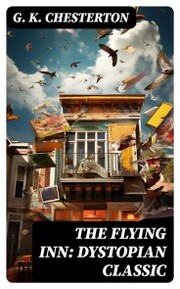Detailansicht
The Flying Inn: Dystopian Classic
eBook
ISBN/EAN: 8596547715368
Umbreit-Nr.: 1359552
Sprache:
Englisch
Umfang: 236 S., 0.55 MB
Format in cm:
Einband:
Keine Angabe
Erschienen am 08.11.2023
Auflage: 1/2023
E-Book
Format: EPUB
DRM: Digitales Wasserzeichen
- Zusatztext
- In his novel 'The Flying Inn: Dystopian Classic', G. K. Chesterton explores a dystopian society where the prohibition of alcohol leads to a satirical and fantastical journey. Chesterton's literary style is characterized by wit, humor, and profound social commentary, making this book a unique blend of satire and fantasy. Set in a world where traditional values are under attack, Chesterton uses vivid imagery and clever dialogue to craft a thought-provoking narrative that delves into the absurdity of prohibition and the consequences of government overreach. The novel's fantastical elements serve as a metaphor for the author's criticism of societal norms and the erosion of individual freedom. With its rich literary context and bold social critique, 'The Flying Inn' remains a timeless classic that continues to resonate with readers today. G. K. Chesterton, known for his prolific writing and sharp intellect, was a devout Catholic and a prominent figure in the literary and philosophical circles of his time. His deep-rooted beliefs and keen observations of society informed his work, inspiring him to challenge conventional thinking and provoke critical thought. 'The Flying Inn' is a must-read for those interested in literature that combines fantasy with social commentary, offering a fresh perspective on the issues that continue to shape our world.
- Kurztext
- Thomas Aquinas was one of the most significant Christian thinkers of the middle ages and ranks among the greatest philosophers and theologians of all time. In the mid-thirteenth century, as a teacher at the University of Paris, Aquinas presided over public university-wide debates on questions that could be put forward by anyone about anything. The Quodlibetal Questions are Aquinas's edited records of these debates. Unlike his other disputed questions, which are limited to a few specific topics such as evil or divine power, Aquinas's Quodlibetal Questions contain his treatment of hundreds of questions on a wide range of topics--from ethics, metaphysics, philosophy of mind, and philosophy of religion to dogmatic theology, sacramental theology, moral theology, eschatology, and much more. And, unlike his other disputed questions, none of the questions treated in his Quodlibetal Questions were of Aquinas's own choosing--they were all posed for him to answer by those who attended the public debates. As such, this volume provides a window onto the concerns of students, teachers, and other interested parties in and around the university at that time. For the same reason it contains some of Aquinas's fullest, and in certain cases his only, treatments of philosophical and theological questions that have maintained their interest throughout the centuries.
- Autorenportrait
- Gilbert Keith Chesterton (1874-1936) was a prominent English writer, poet, philosopher, and Christian apologist, known for his iridescent wit and an imaginative storytelling style that has beguiled readers for over a century. Chesterton's literary corpus spans a wide array of genres, including detective fiction, like his celebrated Father Brown stories, literature and cultural critiques, philosophical and theological musings, and poetry, which together exemplify his broad intellectual pursuits and deep moral convictions. Among his numerous works, 'The Flying Inn: Dystopian Classic' stands out as a satirical novel that offers incisive commentary on societal restrictions and religious hypocrisy through a tale of resistance and human spirit in a rapidly changing world. His fiction often intertwines themes of whimsy and paradox, with 'The Flying Inn' reflecting his distinctive approach by using a dystopian narrative to critique modern ideologies. Chesterton's elegant prose, clarity of thought, and fondness for paradox has significantly influenced various literary circles and thinkers. Furthermore, his enduring influence on both Christian apologetics and English literature is evident in his canonization as a literary figure and defense of the Christian faith.
